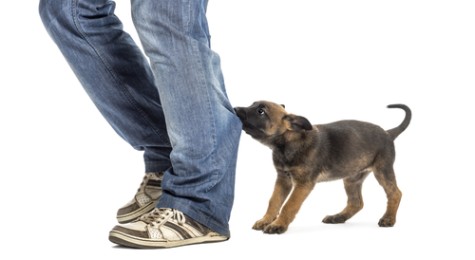Medical alert: If you know for certain or if you even suspect that your dog has eaten an ibuprofen tablet, then call the vet immediately. This is a medical emergency and your dog needs treatment as soon as possible.
Connect with a verified veterinarian in minutes. Licensed vets are available 24/7 to answer your questions. No need to worry about your furry family member.
Over the counter painkillers are found in all of our medicine cabinets. One of the most popular OTC painkillers is ibuprofen.
What is Ibuprofen?
Ibuprofen is a non-steroidal anti-inflammatory drug (NSAID) that’s commonly used in humans as a fever reducer and painkiller. This medication is found under many brand names including Midol, Motrin, Advil and more. It may also be found in some prescription-strength medications (this means the dose is larger than in the over the counter form of the medicine).
In dogs, however, this medication can be extremely toxic. You should never give ibuprofen to your fur baby, unless directed to do so by the vet. Just one tablet is enough to cause a medical emergency in your canine companion. Ibuprofen can easily poison your dog, or even cause death.
Symptoms of Ibuprofen Poisoning in Dogs
Your dog may show these signs and sometimes if he’s accidentally eaten ibuprofen—these are signs of ibuprofen poisoning in dogs:
- Diarrhea
- Bloody feces (red or black)
- Blood in vomit
- Vomiting
- Nausea
- Loss of appetite
- Weight loss
- Stomach ulcers/perforation
- Increased thirst
- Increased urination
- Decrease or lack of urine
- Seizures
- Incoordination
- Coma
- Death
If your dog has eaten ibuprofen tablets, be sure to call the vet immediately. When you head to the vet’s office, take the bottle of medication along with you for the vet to see.

Review symptoms, medications & behavior to keep your pets healthy with a Vet Online in just minutes.
Ask a Vet Live NowDiagnosis and Treatment of Ibuprofen Toxicity in Dogs
When you get to the vet, they will ask you questions, which may include:
- How long ago did your dog eat the ibuprofen?
- Do you know how many tablets he ate?
- What signs and symptoms have noticed?
After this, the vet will perform a physical examination and check your fur baby for symptoms. They will mostly likely also order blood test including:
- Chemistry panel
- Complete blood count (CBC)
- Urinalysis
- Renal panel
If your dog has recently eaten the ibuprofen, then the vet may induce vomiting and/or give your fur baby activated charcoal over the next few hours. The activated charcoal keeps the medication from being absorbed into your dog’s digestive tract, which will prevent side effects.
Depending on your fur baby’s condition, the vet may also choose to provide him with IV fluids, flushing of his stomach, and other medications to treat side effects from the ibuprofen. In some cases, it may be necessary to treat a dog with blood transfusions in more serious cases.
If your fur baby ate ibuprofen and he is treated quickly, the prognosis is very good. However, if your fur baby was taken to the vet with more advanced symptoms, it is possible the dog may not survive. This is why seeking treatment as soon as possible is imperative.
With quick treatment, most dogs go on to have happy, long lives. So, be sure to get your canine companion to the vet as quickly as possible if you have seen or suspect he’s eaten ibuprofen.
Connect with a verified veterinarian in minutes. Licensed vets are available 24/7 to answer your questions. No need to worry about your furry family member.

Julie
Julie is a graduate of the University of North Carolina, Wilmington, where she studied Animal science. Though contrary to the opinion of her parents she was meant to study pharmacy, but she was in love with animals especially cats. Julie currently works in an animal research institute (NGO) in California and loves spending quality time with her little cat. She has the passion for making research about animals, how they survive, their way of life among others and publishes it. Julie is also happily married with two kids.
Review symptoms, medications & behavior to keep your pets healthy with a Vet Online in just minutes.
Ask a Vet Live Now




